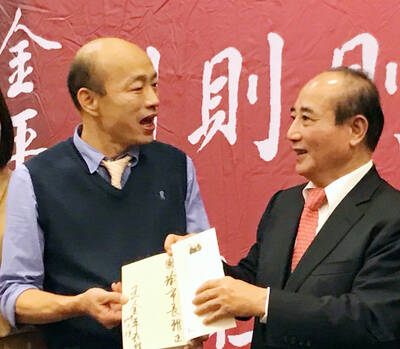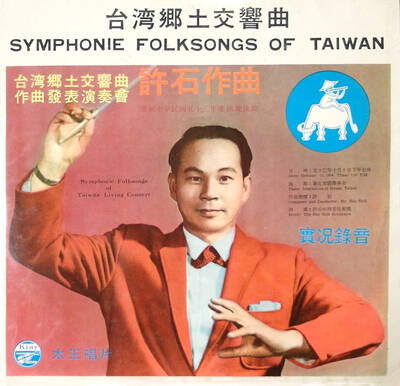“Disinformation” is fast becoming a dirty word — a label so contentious in a hyperpolarized political climate that some researchers who study the harmful effects of falsehoods are abandoning it altogether.
In an era of online deception and information manipulation, the study of disinformation seems more critical than ever, but researchers are battling funding cuts, a surge of abuse and even death threats — fueled in part by accusations from conservative advocates of a liberal bias.
Some researchers are now opting for more neutral language — words, and at times, technical jargon that are less likely to inflame or derail vital public discourse about falsehoods flooding the Internet.

Photo: Bloomberg
Earlier this year, the watchdog NewsGuard announced it was retiring the labels “misinformation” and “disinformation” — terms it said were “politicized beyond recognition and turned into partisan weapons by actors on the right and the left, and among anti-democratic foreign actors.”
It renamed its so-called “Misinformation Fingerprints” database to “False Claim Fingerprints,” opting for language that it said was “more precise” and “harder to hijack.”
“A simple phrase like ‘false claim’ is more powerful and precise than ‘misinformation’ and ‘disinformation,’” said NewsGuard’s McKenzie Sadeghi.
“It names the problem plainly and directs attention to the content itself — without triggering partisan reflexes or rhetorical spin.”
’FRACTURED INFORMATION ECOSYSTEM’
Terms such as “fake news,” “misinformation” and “disinformation” pre-date the Internet age, but they have never been more heavily weaponized by governments and vested interests to silence critics and thwart legitimate debate.
Peter Cunliffe-Jones, author of the book Fake News — What’s the harm, has advocated for using more specific alternatives ranging from false or unproven to mislabeled or fabricated.
Such labels “do not simply declare information false but explain the way in which information is untrue or misleading,” he said. “That way, we hopefully create less room for cynical disputes and more for better understanding.”
Authoritarian states including Russia routinely dismiss credible Western media reports as disinformation.
Some governments have even co-opted fact-checking itself — launching state-sponsored “fact checks” to legitimize their own propaganda and spin.
“In today’s fractured information ecosystem, one person’s ‘misinformation’ or ‘disinformation’ is another’s truth,” said Sadeghi.
“And in that ambiguity, bad actors win.”
’PROVACTIVE, DANGEROUS’
The debate comes as major tech platforms pull back key anti-misinformation guardrails — including scaling down content moderation and reducing their reliance on human fact-checkers, who reject accusations of liberal bias.
However, Emerson Brooking, from the Atlantic Council’s Digital Forensic Research Lab (DFRLab), said the problem with abandoning the term disinformation was the lack of a clear replacement to describe the intention to deceive.
“This idea of intentionality is very important,” he said. “If we see thousands of fake accounts posting a false claim in unison, we can reasonably describe it as a disinformation campaign.”
The label, however, has become so heavily politicized that officials in US President Donald Trump’s administration have equated disinformation research with censorship.
Following Trump’s executive order on “ending federal censorship,” the National Science Foundation recently canceled hundreds of grants, including projects that supported disinformation research.
In April, Secretary of State Marco Rubio shut down the State Department’s Counter Foreign Information Manipulation and Interference (R/FIMI) hub — formerly known as the Global Engagement Center (GEC) — which was responsible for tracking and countering disinformation from foreign actors.
Rubio justified its closure, saying that it was the government’s responsibility to “preserve and protect the freedom for Americans to exercise their free speech.”
“It’s true that the term (disinformation) has been politicized, and that using it can feel provocative — even dangerous,” Brooking said.
“But so long as it has descriptive value, it should still be used. My organization fights authoritarian information manipulation around the world — if we start censoring our own language, we aren’t doing a good job.”

The depressing numbers continue to pile up, like casualty lists after a lost battle. This week, after the government announced the 19th straight month of population decline, the Ministry of the Interior said that Taiwan is expected to lose 6.67 million workers in two waves of retirement over the next 15 years. According to the Ministry of Labor (MOL), Taiwan has a workforce of 11.6 million (as of July). The over-15 population was 20.244 million last year. EARLY RETIREMENT Early retirement is going to make these waves a tsunami. According to the Directorate General of Budget Accounting and Statistics (DGBAS), the

Last week the Chinese Nationalist Party (KMT) announced that the legislature would again amend the Act Governing the Allocation of Government Revenues and Expenditures (財政收支劃分法) to separate fiscal allocations for the three outlying counties of Penghu, Kinmen and Matsu from the 19 municipalities on Taiwan proper. The revisions to the act to redistribute the national tax revenues were passed in December last year. Prior to the new law, the central government received 75 percent of tax revenues, while the local governments took 25 percent. The revisions gave the central government 60 percent, and boosted the local government share to 40 percent,

Many will be surprised to discover that the electoral voting numbers in recent elections do not entirely line up with what the actual voting results show. Swing voters decide elections, but in recent elections, the results offer a different and surprisingly consistent message. And there is one overarching theme: a very democratic preference for balance. SOME CAVEATS Putting a number on the number of swing voters is surprisingly slippery. Because swing voters favor different parties depending on the type of election, it is hard to separate die-hard voters leaning towards one party or the other. Complicating matters is that some voters are

Sept 22 to Sept 28 Hsu Hsih (許石) never forgot the international student gathering he attended in Japan, where participants were asked to sing a folk song from their homeland. When it came to the Taiwanese students, they looked at each other, unable to recall a single tune. Taiwan doesn’t have folk songs, they said. Their classmates were incredulous: “How can that be? How can a place have no folk songs?” The experience deeply embarrassed Hsu, who was studying music. After returning to Taiwan in 1946, he set out to collect the island’s forgotten tunes, from Hoklo (Taiwanese) epics to operatic